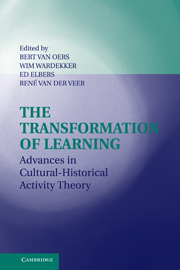Book contents
- Frontmatter
- Contents
- List of Contributors
- Preface
- INTRODUCTION
- SECTION ONE TENETS OF ACTIVITY THEORY
- SECTION TWO IDENTITY, DIVERSITY, AND INCLUSION
- Introduction to Section Two: Identity, Diversity, and Inclusion
- 9 Identity Shifts in Informal Learning Trajectories
- 10 No Human Being Is Illegal: Counteridentities in a Community of Undocumented Mexican Immigrants and Children
- 11 Cultural Identity and Emigration: A Study of the Construction of Discourse about Identity from Historical-Cultural Psychology
- 12 Diversity in the Construction of Modes of Collaboration in Multiethnic Classrooms: Continuity and Discontinuity of Cultural Scripts
- 13 “Discourse” in Cultural-Historical Perspective: Critical Discourse Analysis, CHAT, and the Study of Social Change
- 14 Reason and Dialogue in Education
- SECTION THREE DYNAMICS OF ACTIVITY AND THE VARIATIONS OF LEARNING
- Index
- References
Introduction to Section Two: Identity, Diversity, and Inclusion
Published online by Cambridge University Press: 25 August 2009
- Frontmatter
- Contents
- List of Contributors
- Preface
- INTRODUCTION
- SECTION ONE TENETS OF ACTIVITY THEORY
- SECTION TWO IDENTITY, DIVERSITY, AND INCLUSION
- Introduction to Section Two: Identity, Diversity, and Inclusion
- 9 Identity Shifts in Informal Learning Trajectories
- 10 No Human Being Is Illegal: Counteridentities in a Community of Undocumented Mexican Immigrants and Children
- 11 Cultural Identity and Emigration: A Study of the Construction of Discourse about Identity from Historical-Cultural Psychology
- 12 Diversity in the Construction of Modes of Collaboration in Multiethnic Classrooms: Continuity and Discontinuity of Cultural Scripts
- 13 “Discourse” in Cultural-Historical Perspective: Critical Discourse Analysis, CHAT, and the Study of Social Change
- 14 Reason and Dialogue in Education
- SECTION THREE DYNAMICS OF ACTIVITY AND THE VARIATIONS OF LEARNING
- Index
- References
Summary
In a recent publication, Kieran Egan (2002) has launched an attack on both “progressive” and “traditional” ideas about the goals of education: the first, because they depend on a wrong view of human development; the second, because they lead to a utilitarian view; and both, because ultimately they shortchange children's intellectual development. Egan also proposes an alternative (elaborated more fully in Egan, 1997):
The education of children today is a matter of ensuring that they make their minds most abundant by acquiring the fullest array of the cultural tools that can, through learning, be made into cognitive tools. I have drawn on Vygotsky in trying to make this argument, because he more than anyone seems to have had an understanding of the process whereby the cultural becomes cognitive and an understanding that it is the cognitive tools we acquire that most clearly and importantly established for us the character of our understanding.
(2002, p. 184)Although the expression “the fullest array of the cultural tools” raises the not unimportant question of the contents of curriculum, we will not concern ourselves with that here. Instead, our focus in this section of the present volume is inspired by what Egan calls the making of cultural tools into cognitive tools, or appropriation. Or, to be more precise, the issue is how to understand the human mind as it becomes progressively informed by cognitive tools.
Information
- Type
- Chapter
- Information
- The Transformation of LearningAdvances in Cultural-Historical Activity Theory, pp. 157 - 162Publisher: Cambridge University PressPrint publication year: 2008
References
Accessibility standard: Unknown
Why this information is here
This section outlines the accessibility features of this content - including support for screen readers, full keyboard navigation and high-contrast display options. This may not be relevant for you.Accessibility Information
- 1
- Cited by
